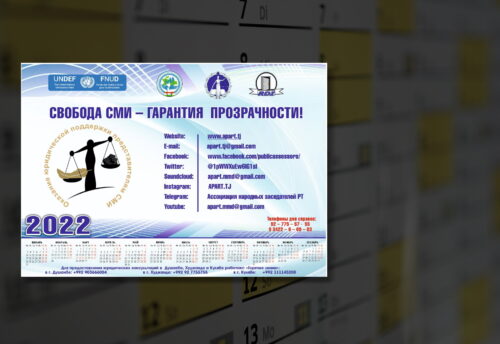What provision of the Constitution gives the right to access to information?
Ranzhet Yatimov, lawyer of NGO “Khoma”
There are two norms in the Constitution of the Republic of Tajikistan that can be applied as a fundamental right to receive information. Article 31 of the Constitution gives the right to Citizens individually or jointly with others to apply to state bodies for information. When we mention the prohibition by law, we mean information related to the institution of secrecy (State secret, family, medical, commercial, lawyer, etc., as well as information about personal data, private life, which cannot be distributed without consent).
Article 25 obliges (they are obliged to) State bodies, public associations, political parties and officials to provide everyone with the opportunity to receive and familiarize themselves with documents relating to their rights and interests, except in cases provided for by law (as amended by the referendum of June 22, 2003). The words used “except as provided by law” are the same as the above prohibitions.
What laws regulate the information field?
In Tajikistan, there are a number of laws regarding information relations:
1. Law of the Republic of Tajikistan “On Informatization” No. 40 06.08. 2001 current
2. Law of the Republic of Tajikistan “On Information”No. 55 10.05. 2002 current
3. Law of the Republic of Tajikistan” On the protection of information” No. 71 02.12. 2002 current
4. Law of the Republic of Tajikistan” On the right to access to information” No. 411 18.07. 2008 current
5. Law of the Republic of Tajikistan “On environmental information”№705 03.25. 2011 current
These laws give a complete understanding of the categories of information, the mechanisms of transmission, protection and receipt of information. The name of the laws speaks for itself, that is, which direction is regulated by this or that law. Mass media and journalists on access to information have a sectoral law and use the norms of these laws in their professional activities.
1. Law of the Republic of Tajikistan “On Television and Radio Broadcasting” No. 382 14.12. 1996 current
2. Law of the Republic of Tajikistan “On periodicals and other mass media” No. 961 19.03. 2013 current
The law on television and radio broadcasting has been inherited by us since Soviet times and the norm on the right to receive information is spelled out in this law as follows: Article 20. “Television and radio organizations, their employees have the right to receive necessary information from state bodies, associations of citizens, enterprises, institutions, organizations to carry out its activities in the manner prescribed by the current legislation of the Republic of Tajikistan. Officials providing information are responsible for its accuracy. TV and radio organizations have the right to receive, but the rule on the timing of receiving information and delaying the preparation of information for owners is not in this law. Therefore, TV and radio organizations refer to the Law on the Periodical Press and Other Mass Media in terms of deadlines, because this law spells out the procedures in more detail, terms and procedure for presenting a deferment. It sounds like this:
Article 23. Right to receive information
Any person has the right to receive reliable information through the media about the activities of state bodies, organizations and their officials.
The mass media have the right to receive information from state bodies, organizations and their officials in the manner prescribed by the legislation of the Republic of Tajikistan. State bodies, organizations and their officials, by transmitting the necessary information to the media, provide favorable conditions for familiarization with the documents.
State bodies, organizations and their officials are obliged to respond to the necessary official information, critical and analytical materials of the mass media that do not require additional study within up to three working days after the request or publication (broadcast) of the relevant information. State bodies, organizations and their officials shall immediately provide urgent information of public importance that is not included in the list of information constituting a state secret and other information protected by law and does not require additional study.
The heads of state bodies and organizations are obliged through the appropriate mass media to respond to critical and analytical material related to their activities and requiring additional study, no more than two weeks after their publication (broadcast).
In case of refusal by the heads of state bodies and organizations to provide information, a representative of the mass media may file a complaint with higher authorities or, in accordance with the procedure established by the legislation of the Republic of Tajikistan, to the court.
Article 24. Deviation and delay in providing information
Refusal to provide the requested information is possible if it contains the information specified in Article 6 of this Law (Article 6. Inadmissibility of abuse of freedom of speech 1. It is prohibited to disseminate information containing state secrets or other information protected by law, information calling for the violent constitutional order, committing a criminal act, inciting racial, national, local, religious, linguistic hatred, propaganda of war, violence, terrorist and extremist activities, causing harm to the integrity and independence of the state, as well as propaganda and advertising of materials and information of a pornographic nature.) The mass media are responsible for the objectivity and reliability of the information they disseminate. The refusal notice shall be delivered to the mass media within three days after the receipt of the written request for information.
Postponement in the provision of the requested information is possible if the provision of the required information is not possible within three days. A notice of deferment is served to the applicant within three days of receipt of the written request for information, indicating the reason for the delay and the deadline for providing information.
In case of refusal to provide information, the media outlet may apply to a higher authority or, in accordance with the procedure established by the legislation of the Republic of Tajikistan, to the court.
For individuals and legal entities, there is another law that regulates relations related to the procedure for submitting and considering applications from individuals and legal entities in order to protect the rights, freedoms and their legitimate interests.
1 Law of the Republic of Tajikistan “On appeals of individuals and legal entities” No. 1339 23.07. 2016 current
This law gives the right to individuals and legal entities to apply in various forms of appeals orally, in writing, electronically and by telephone. But the terms for consideration of the appeal are considered within thirty days, and appeals that do not require additional study and research are considered within fifteen days from the date of registration.
The laws mention liability in case of refusal of information to the applicant. What is the punishment for those who break the law to obtain information?
There are two Codes of the Republic of Tajikistan that punish for the extension of terms and failure to provide information:
1. Code of the Republic of Tajikistan on Administrative Offenses December 31, 2008 current Article 87 of the Code of Administrative Offenses of the Republic of Tajikistan. Violation of the procedure and terms for consideration of applications from individuals and legal entities
Unlawful refusal to consider an appeal, violation without good reason of the procedure and terms for considering appeals, making an unreasonable decision that caused a violation of the rights and legitimate interests of individuals and legal entities, in the absence of signs of a crime,
– entail the imposition of a fine in the amount of thirty to forty indicators for calculations. ( indicator for calculations 58 somoni)
Article 88 of the Code of Administrative Offenses of the Republic of Tajikistan. Refusal to provide information to a citizen
Refusal by an official to provide a citizen with information collected in the established manner that directly affects the rights and freedoms of a citizen, or untimely provision of such information, as well as failure to provide information in cases provided for by law, or provision of incomplete or unreliable information to a citizen, in the absence of signs of a crime,
– entail the imposition of a fine in the amount of thirty to forty for settlements. (indicator for calculations 58 somoni)
2. Criminal Code of the Republic of Tajikistan 21.05.1998 current Article 148 of the Criminal Code of the Republic of Tajikistan. Refusal to provide information to a citizen
Illegal refusal of an official to provide a citizen with documents or materials that directly affect his rights and freedoms and collected in the prescribed manner, as well as providing a person with incomplete or deliberately distorted such information, if this caused damage to the rights and interests of this citizen,
– is punishable by a fine in the amount of three hundred to five hundred times the minimum wage or deprivation of the right to hold certain positions or engage in certain activities for a period of three to five years (the figure for calculations is 58 somoni)
Article 163 of the Criminal Code of the Republic of Tajikistan. Violation of the law on the circulation of citizens
1) Unlawful refusal to consider the appeal of citizens, violations without good reason of the terms for consideration of appeals, adoption of an unreasonable decision that contradicts the law, as well as violations of the law on the appeal of citizens that caused significant harm to the rights or legally protected interests of citizens, society or the state,
– shall be punishable by a fine in the amount of five hundred to eight hundred times the minimum monthly wage, or by corrective labor up to two years, or by arrest for a term up to six months, with deprivation of the right to hold certain positions or engage in certain activities for a term up to three years.
2) Persecution of a citizen by an official in connection with his appeal to a state body, an enterprise, an institution, an organization, a public association, or for the criticism contained in the appeal, as well as for speaking out with criticism in a different form,
– shall be punishable by a fine in the amount of one thousand five hundred to two thousand times the minimum monthly wage, or restraint of liberty for a term of up to five years, with deprivation of the right to hold certain positions or engage in certain activities for a term of three to five years. ( indicators for calculations is 58 somoni)
When preparing a request or a repeated request for information, the media and journalists must necessarily apply these norms as references in case of violation of the norms on access to information.
Information taken from the website https://www.khoma.tj/khoma/




Leave a Reply